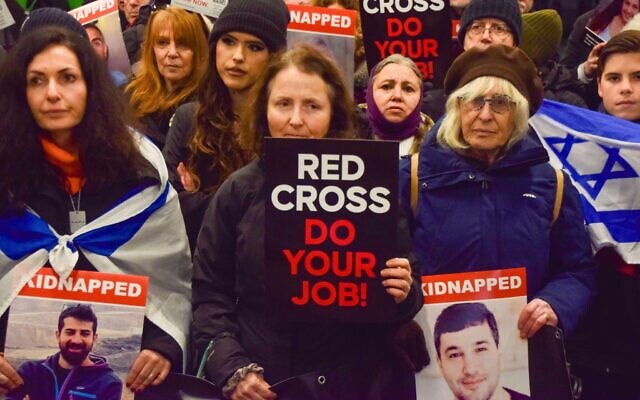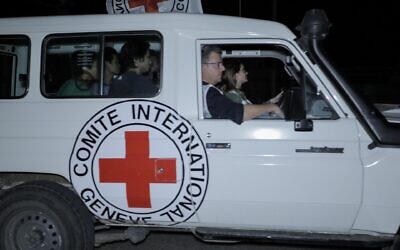SPECIAL REPORT: Red Cross: We’re at the mercy of Hamas
Embattled aid agency responds to scathing criticism after it’s ridiculed as a mere ‘Uber service’ for hostages
Jenni Frazer is a freelance journalist

The International Red Cross (ICRC) has insisted it can’t “force its way in” to visit Israeli hostages, as it responded to bitter criticism of its response to the crisis by saying it was not in the business of publicly criticising one side of any conflict.
But, in a telling and wide-ranging interview with Jewish News, Matthew Morris, ICRC’s spokesperson for the UK and Ireland, promised his organisation would “never give up” attempts to gain access to the 135 Israeli hostages still held by Hamas in Gaza.
Echoing ICRC president, Mirjana Spoljaric Egger, who met Benjamin Netanyahu last week on her first visit to Israel since the outbreak of the war, Morris said he believed that much of the criticism arose from a misunderstanding of how the ICRC operated.
He said the organisation, with more than 20,000 staff, worked in 100 conflict zones across the world “in some of the most dangerous places on earth. Conflict, by default, means that there is no trust, and that there are information warfare campaigns”.
The ICRC condemned the taking of hostages as soon as it had happened, Morris said. “The hostages remain a top priority for the ICRC. Since day one we have made it clear that the taking of hostages is prohibited under international humanitarian law. We have consistently called for all hostages to be released and have expressed this view directly with Hamas, including in face-to-face meetings, and in public statements.
“All those held must be treated humanely and with dignity and must be able to
contact their loved ones. The ICRC has made repeated requests to visit the hostages to check on their well-being. But for this to happen, we need to be given access; we cannot simply force our way in”.
Did that mean the ICRC was aware of where the hostages were? Morris denied this. “We are the Red Cross. We don’t have an ability or knowledge to track where hostages are kept. It’s worrying when I hear things like that, because it assumes we have extra special powers, that we know where the hostages are and that somehow we’re going to go in and get them. We are making it very clear, widely, that is not true”.
In common with its work worldwide, Morris said, the ICRC did not talk about the mechanics of the way it worked or the details of discussions it had with warring parties. Referring to the meeting between the ICRC president and Israel’s prime minister, Morris noted that the Prime Minister’s Office had tweeted “a three minute video from that meeting. That is not something that we do — we treat those meetings as private and confidential.”

In her meeting with Mr Netanyahu, the ICRC president rejected his criticism that the agency was not doing enough to secure access to the hostages. He said: “You have every avenue, every right and every expectation to place public pressure on Hamas.” But she told him bluntly: “It is not going to work because the more public pressure we seemingly would do, the more they will shut the door.”
Morris said: “We always treat those meetings as confidential and bilateral. Many of those who criticise us know that. They know how we work. They say to our faces that they know how we work. But there are often cases, in recent years, where parties to a conflict talk publicly and demand more from us, or demand that we visit this person or that we don’t visit that person.
“They demand that we send aid in and then say we’re sending in the wrong aid. Many of those people who do that know exactly how we work, and they know that we are not going to publicly condemn one side or the other.”
What has never been explained is exactly why Hamas is denying the ICRC access to the hostages. Morris confirmed that a meeting was held in Qatar in mid-November between the ICRC president and “Hamas leadership, whom she met face to face”, but he would not disclose the content of those discussions. In fact she met Ismaël Haniyeh, chair of Hamas’ political bureau, and held separate meetings with Qatari leaders. In recent weeks Spoljaric has also met families of hostages “multiple times”, as well as with senior Israeli and Palestinian leaders.
Morris said ICRC colleagues in both Israel and Gaza had received death threats. “Every one of them says that where there is fair criticism — absolutely, and we accept it.
“We try and have dialogue with Hamas at different levels,” Morris told JN. “We also have multiple dialogue entry points with the Israelis. We also have dialogue and entry points with states who can have influence with the parties to the conflict. We talk about the parties to the conflict because under international law, it is their responsibility to provide for the populations under their control.”
Morris was at pains to stress that while the ICRC did not share details in public of discussions it held with warring sides, in private it was often different.
“A lot of the work that the ICRC does is around the promotion and the respect [necessary] of international humanitarian law. Our dialogue with any parties to the conflict will be at multiple levels, some of it will be where we raise our concerns and what we are asking to happen.”
The agency, he reminded critics, had been formed more than 160 years ago with the central aim of being “a neutral and impartial humanitarian organisation, there to support the victims of conflict, no matter who they are, where they came from, regardless of their religion or ethnicity, whether they are soldiers or not”.
If a door closes, we will try and open another one. There are many ways to try and improve things. We will not give up and we will continue to try.
He insisted that the ICRC was indeed “doing our job” despite criticism to the contrary, adding that “some of my colleagues have died, doing our job. We take it very seriously. [In this case] we have been clear from the outset that the taking of hostages by Hamas was unacceptable. Our position is very clear: the taking of hostages is not compatible with international humanitarian law, and we’ve said so, publicly and in private. That position hasn’t changed, and will not change.”
Morris said ICRC colleagues in both Israel and Gaza had received death threats. “Every one of them says that where there is fair criticism — absolutely, and we accept it. I’ve sat with people who have had loved ones who have been taken and I can’t imagine the horror that they are going through. I’ve tried to reassure them from what I know, which is that we are absolutely doing everything we can.
“But the public discourse that it is ‘our job’ to get them out? We are a neutral, impartial humanitarian organisation trying our best to facilitate an agreement, if there is an agreement. If there isn’t an agreement, what we certainly can’t do is drive into a battlefield. The expectation that we suddenly find out where the hostages are, and we drive ourselves there and knock on the door – that is not going to happen. That is an unrealistic expectation that is placed on a humanitarian organisation.”
ICRC’s guiding principle, Morris said, was “do no harm”.
“If a door closes, we will try and open another one. There are many ways to try and improve things. We will not give up and we will continue to try. When we meet families of hostages and they criticise us, we accept it. But it is the responsibility of the parties to the conflict to act in a certain way, to do certain things and not do certain things.
“For example, on humanitarian evacuations: the responsibility for that cannot be transferred to us — in an active conflict zone, with explosions, roads that have been blown up, casualties being taken all over the place… if we are asked by both sides to operate in that pause and there is trust, then we will do it. It has to be safe… and it has to be transparent.
“We are civilians, unarmed, working in an active conflict zone, without fear or favour, with no more power than anyone else. We are not an investigative authority.”

Thank you for helping to make Jewish News the leading source of news and opinion for the UK Jewish community. Today we're asking for your invaluable help to continue putting our community first in everything we do.
For as little as £5 a month you can help sustain the vital work we do in celebrating and standing up for Jewish life in Britain.
Jewish News holds our community together and keeps us connected. Like a synagogue, it’s where people turn to feel part of something bigger. It also proudly shows the rest of Britain the vibrancy and rich culture of modern Jewish life.
You can make a quick and easy one-off or monthly contribution of £5, £10, £20 or any other sum you’re comfortable with.
100% of your donation will help us continue celebrating our community, in all its dynamic diversity...
Engaging
Being a community platform means so much more than producing a newspaper and website. One of our proudest roles is media partnering with our invaluable charities to amplify the outstanding work they do to help us all.
Celebrating
There’s no shortage of oys in the world but Jewish News takes every opportunity to celebrate the joys too, through projects like Night of Heroes, 40 Under 40 and other compelling countdowns that make the community kvell with pride.
Pioneering
In the first collaboration between media outlets from different faiths, Jewish News worked with British Muslim TV and Church Times to produce a list of young activists leading the way on interfaith understanding.
Campaigning
Royal Mail issued a stamp honouring Holocaust hero Sir Nicholas Winton after a Jewish News campaign attracted more than 100,000 backers. Jewish Newsalso produces special editions of the paper highlighting pressing issues including mental health and Holocaust remembrance.
Easy access
In an age when news is readily accessible, Jewish News provides high-quality content free online and offline, removing any financial barriers to connecting people.
Voice of our community to wider society
The Jewish News team regularly appears on TV, radio and on the pages of the national press to comment on stories about the Jewish community. Easy access to the paper on the streets of London also means Jewish News provides an invaluable window into the community for the country at large.
We hope you agree all this is worth preserving.





















